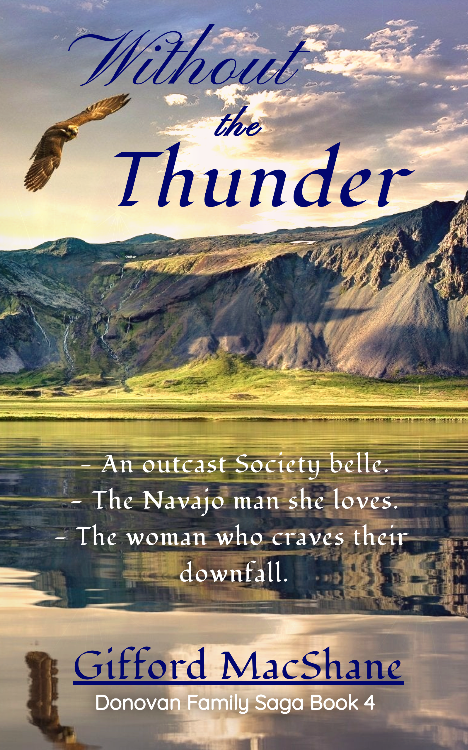Interview with Gifford MacShane
Author of Without the Thunder
I'm the author of historical fiction that celebrates the resilience of the human spirit. My novels feature a family of Irish immigrants who settle in the Arizona Territory. My characters always have hidden flaws and strengths that I draw on as they grapple with physical and emotional conflicts.
Singing almost before I could talk, I've always loved folk music, whether Irish, Appalachian, or the songs of cowboys. My love of the Old West goes back to childhood, when my father introduced me to Zane Grey. Later, I became interested in Irish history after realizing his ancestors (who emigrated to the US in the late 1800s) had lived through the Great Potato Famine. I've combined these three interests into a series of romances, each with traditional song lyrics and a dash of Celtic mysticism.
The DONOVAN FAMILY SAGA includes WHISPERS IN THE CANYON (Book 1), THE WOODSMAN’S ROSE (Book 2), RAINBOW MAN (Book 3), and THE WINDS OF MORNING, a prequel novella requested by my fans.
I'm a member of the Historical Novel Society and an #OwnVoices writer. An avid gardener, I cultivate pollinator plants and grow tomatoes (not enough) and zucchini (too much). I love to sing, though my cats don’t always appreciate it. A grammar nerd who still gets a kick out of diagramming sentences, I currently live in Pennsylvania with my husband Richard, the Pied Piper of stray cats.
Buy this book
Quick description of the book for a new reader - what should they expect?
- Without the Thunder is a multicultural historical western romance with a dash of mysticism. Book 4 in the Donovan Family Saga, it can be read as a stand-alone, and is intended for a mature audience.
What was your inspiration for this book?
- Each book in the Donovan Family Saga inspires me to write the next one. Since the family came from Ireland as my father's people did, I never get tired of learning about their culture. As I write each book, I kind of fall in love with one of the characters who's not the main focus. Then I like to see what trouble I can get them into and how they'll manage to find their way out.
Does the genre you normally read have a direct influence on your writing? What authors, or books have influenced you?
- Not really. Though I write historical fiction, you can usually find me reading mysteries. Those plots require a more stringent style than I have, but I can usually pick up a pointer or two from them.
Style: Look Homeward Angel by Thomas Wolfe and, amazingly, J. D. Robb’s “In Death” series
Characterization: Zane Grey, Dick Francis
Setting & Atmosphere: William Faulkner
Can you tell us a little about the locations in your book?
- The fictional village of White's Station, as well as the outlying ranches and farms, is located in the Arizona Territory. The books take place in the late 1800s. White's Station is a fairly remote location and, though there have been individuals who don't fit the mold, most of the villagers are invested in taking care of one another.
What advice would you give to aspiring authors? What's the best advice you ever got?
- Don’t get confused by all the “rules” other authors propound—things like “no adverbs” or “only use said & asked in dialogue”. These are style choices every author must make for themselves.
The only universal rules are grammar rules and you need to get a good handle on them. Then you can break them deliberately to add emphasis to your writing.
BEST ADVICE I EVER HEARD? Any word is a good word if it fits the needs of the sentence.
Could you talk a little about your writing process?
- Short question = long answer.
My first draft process is somewhat different from most people’s. Since I use a third-person-multiple point of view, I rarely complete a chapter in one sitting, as I find it difficult to get into more than one character’s head simultaneously. So I’ll write from Character X’s viewpoint and then stop.
Before I begin to write from Character Y’s viewpoint, I always look back to get acclimated in the scene. As I do that, I’ll clean up any grammar errors and typos, and highlight anything that didn’t come out the way it was in my mind. I’ll continue like that until the chapter’s done.
Before moving on, I’ll print out the entire chapter and read it for continuity and rhythm, and I’ll clean up those highlighted problems. With every third chapter, I print out the last three together and repeat the editing process. Then, every 50-75 pages, I print the manuscript from the beginning, and edit it to make any other changes that seem to be needed.
I’ll continue that way until I’ve written the final chapter. Then I print the manuscript from the beginning to take these steps again. That’s when I consider my first draft to be done.
The pro of this method? The manuscript is fairly clean when I first reach the end. The con? Sometimes I find the first half of the book is much more smooth reading than the second.
I’m not going to recommend this process to everyone, as I’m sure it would drive some people stark raving mad. But I’ve tried to change—to keep writing and do all the editing at the end. No matter how many experts recommend it, I just can’t do it.
SELF-EDITING:
If at the conclusion of the previous section, you asked, “How is that a first draft when the editing’s all done?” Well, it isn’t. Just the simple stuff’s been cleaned up. Being a grammar nerd, I trust my construction skills, but I haven’t yet looked for plot holes, consistent characterization and voice, or emotional impact. And I usually have to revamp the chapter breaks—when I write, I tend to wrap things up in a chapter completely, which is not the optimal way to keep readers engaged.
I also do a review based solely on descriptions, another for the five senses, and one more to make sure I included my research properly. Then there’s the word cloud creator that helps me identify overused words, and I’ll usually have a need to trim by anything up to 8,000 words. Depending on the outcome of all these steps and the nature of the work, I might add a review for local color or history.
Finally, I read the entire manuscript aloud to see where the rhythm might be off—this includes misplaced emphasis and confusing sentence structure as well as the actual flow of words. Only then am I ready to send it to my critique partners.
When the CPs are satisfied, it goes to the beta readers who look at the big picture; usually I’ll send them a questionnaire based on the comments provided by my CPs. At that point, I just cross my fingers and hope their feedback is good.
Which character has had the greatest impact on readers?
- I think John Patrick, the Donovan family patriarch, is the one who has the greatest impact. He guides his family with a strong but gentle hand, and his decisions are always well thought out. Many people have said to me that they'd like to live next door to John Patrick and his family.
Aside from writing, what do you enjoy doing?
- My husband & I rescue cats and at any given time, we'll have up to a dozen rescues and fosters.
Right now, in addition to our regular herd, we have 3 kittens: 2 black males and a female tortoiseshell. Two are just about ready for the furever homes; the third little boy is staying here with us.
I also enjoy the naming process. I once named a cat Potiphar: he was tiny, but such a fierce heart! And there was another little black one that I found sick almost to death in my front garden years ago; I named her Josephine because all she had was “boney parts”.
How would you characterize your style ?
- My style is on the literary side—some say lyrical (**blushes**). I write in the third person multiple POV.
I am definitely a grammar nerd. I have a love affair with the Oxford Comma (my husband understands there’s nothing he can do about that); I’m quite fond of the em-dash, the colon and the semi-colon, though I hate to see any of them used to do the comma’s job. I’ve also coached a couple of ESL novelists in English grammar and sentence construction.
I enjoy the judicious use of adverbs, adjectives and dialogue tags. I have a vast vocabulary, but know how to make my meaning clear. I believe that any word can be used as long as it fulfills the sentence’s needs; as a reader I’m always looking to expand my vocabulary, and I think most readers want that as well. But having said that, I like to use words in a way that enhances rather than disguises their meaning.
Where next? What are you working on now?
- Since Without the Thunder was just released on October 25, I'm busy trying to give it a great send-off. In a few months, I plan to start writing the next book in the series. It will focus on Jake, the youngest Donovan son, and his search for that "one best thing".
Synopsis
An outcast Society belle falls in love with a Navajo man. Can they defeat the woman who’s driven to destroy their happiness?
After falling from grace with her family in Philadelphia, Alicia Beaufort is shunted off to relatives in the Arizona Territory. Disturbed at first by the things she hears about the West, she gradually comes to realize the village of White’s Station has what she’s always longed for: simplicity and peace.
But when Alicia begins to keep company with a Navajo man, she learns that all is not quite as it appears. She finds herself in conflict with the very people who are supposed to be looking after her. And when the man who ruined her shows up, she’s terrified that her past will become known and the villagers will turn against her.
With her family against her and past transgressions looming, Alicia knows she has to fight for what she wants, but she has no experience to draw on. Can she take a stand against her family and former lover? Or will her dreams all come to naught?
WITHOUT THE THUNDER is multicultural adult Historical Romance set in the Old West. Book 4 of the Donovan Family Saga, it can be read as a stand-alone. Fans of the “Sky’s West” novels by Richard S. Wheeler and the “Redemption Mountain” series by Shirleen Davies are sure to enjoy WITHOUT THE THUNDER.

